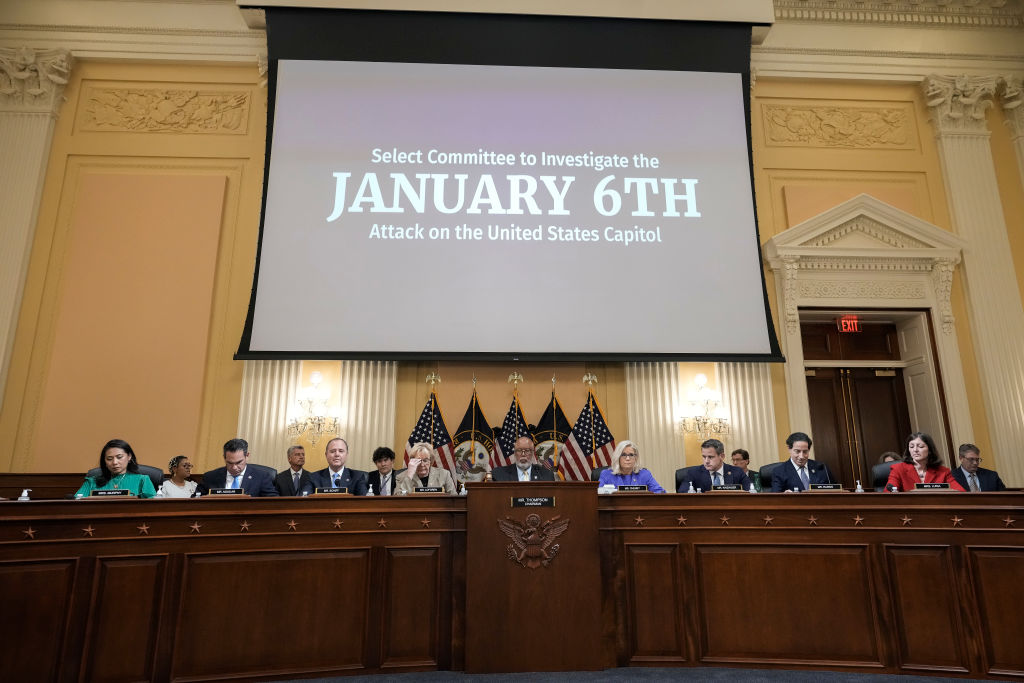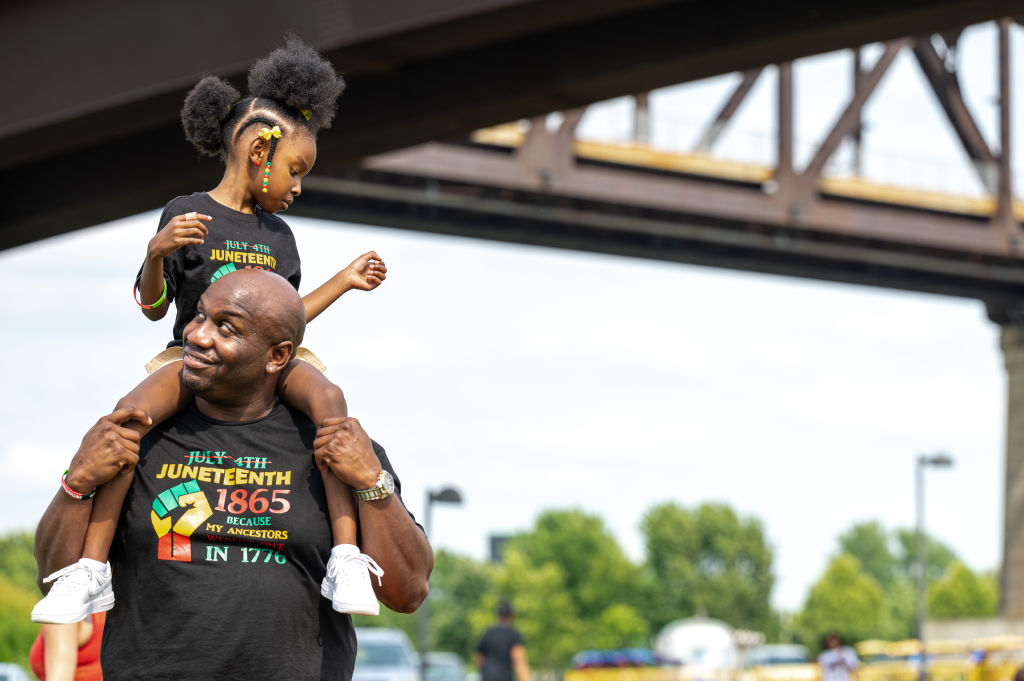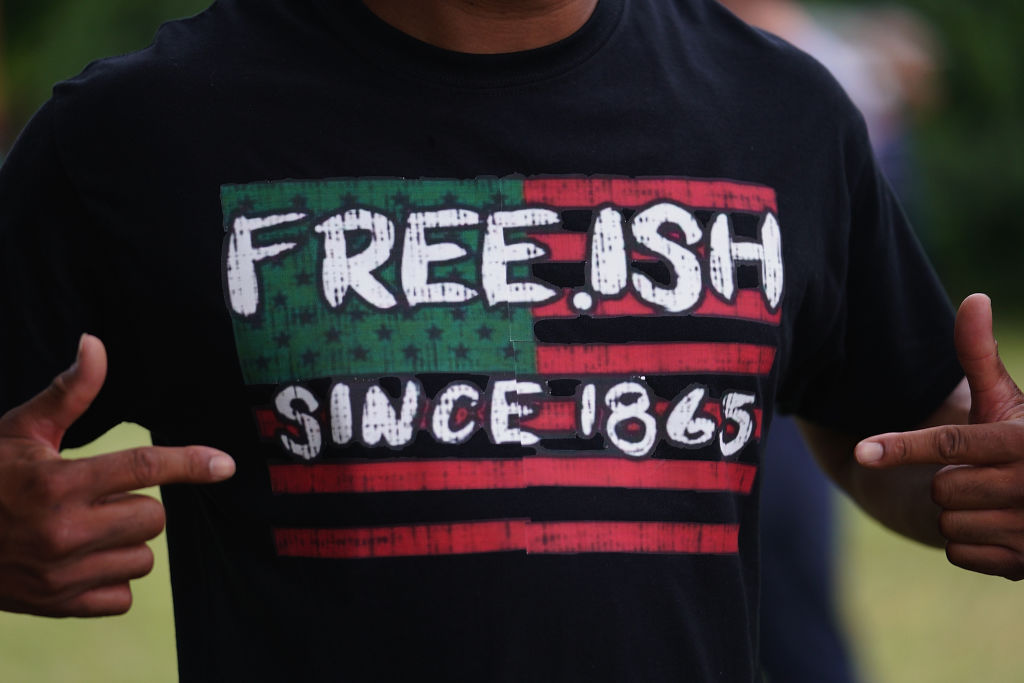Jan 6 Hearings, Juneteenth, Father's Day And The Black Male Narrative
OP-ED: Juneteenth, Father’s Day And The Black Male Narrative: Why The Truth About Jan. 6 Matters

U.S. Rep. Bennie Thompson (D-MS), Chair of the Select Committee to Investigate the January 6th Attack on the U.S. Capitol, joined by fellow Committee members, delivers opening remarks during a hearing on the January 6th investigation on Capitol Hill on June 9, 2022, in Washington, D.C. | Source: Drew Angerer / Getty
Every June is a month of celebrations: my husband’s birthday, our wedding anniversary, Father’s Day and Juneteenth National Independence Day. As my excitement was growing in anticipation, that feeling was suddenly deterred.
News notifications about the ongoing series of televised hearings on the Jan. 6th Capitol insurrection promised a new excitement. This one is rooted in the hope that Americans watching would experience some level of cognitive dissonance witnessing irrefutable evidence about January 6, and they would choose not to defend, excuse, justify or maintain their dangerous beliefs and behaviors, but instead change them.
MORE: Why Black People Should Care About The Jan. 6 Hearings
That hasn’t been the story of America. Historically those in power have used that power to rewrite history or retell stories to fit their own narratives or interests.
For instance, the retelling of Native American history and slavery exists in order to maintain control and power. The truth is that Christopher Columbus did not discover America and slavery was a dehumanizing and oppressive system, one in which individuals resisted and challenged as an expression of their value and humanity.
The United States was built on American Indian land by African labor.
In the days after the initial insurrection hearing, I tried to avoid mentally replaying January 6 traumatic images of the sea of terrorists and gang members climbing barricades, attacking police officers, and breaking down doors and windows as they proudly fought to maintain “their” power.
It struck me that in that sea of terrorists were fathers, sons, uncles, and husbands. I instantly became proud as I was reminded of my truth about the Black men in my life who are very different from these men, the men who are my assets — my father, husband, brothers, and son.
The images that came to mind then were of my father who was the first Black principal since 1969 of Yerger Middle School which since 1915 had been called Yerger High School, the first and only Black vocational training school west of the Mississippi River. My father dedicated 40 years to educating the next generation of doctors, lawyers, nurses, teachers and engineers in rural Hope, Arkansas.
I recounted the hours he spent investing in his teachers and his students. I recall the countless number of emails and letters or comments from past teachers and students sharing the impact my father had on the trajectory of their lives.
“I wouldn’t have made it without you, Mr. Muldrew!” That’s my dad. That’s my legacy.
I reflected on my husband and the number of hours he has spent volunteering as my son’s basketball and soccer coach, the number of times he has complimented our son for a stellar performance at his piano recital, the number of hours he patiently worked with my son on his homework while simultaneously juggling a demanding corporate job. His commitment to his faith and leading his family with values and humility defines my husband. Our Black son and daughter are his legacy as a Black man.

Source: Jon Cherry / Getty
Research shows that the narrative of Black men in this country does not reflect the truth. And the Black men in this country are not a monolith of stereotypes.
Black men are proud. A recent Pew Research study shows that the majority of Black Americans feel that their identity is an important source of pride and plays a significant role in how connected they feel toward each other. Likewise, for many Black adults, where they live shapes how they think about themselves.
Black men are patriotic, but it is a wholly different kind of conspiracy and exclusionary patriotism that is touted by insurrectionists. A 2020 study by the Brookings Institute shows that compared to the civilian labor force, Black men are significantly over-represented in military service. While the military has been an important factor in Black men’s economic mobility, consequently that same dominant patriotism through military service has made them among the most likely to be put in harm’s way on behalf of their service to their country. These are humbling facts considering the less than patriotic treatment toward them.
Black men are also faithful. The role of the Black church in helping to sustain black wealth, hope, and legacy is critical. A 2021 Pew Research report examined the high levels of religious commitment among Black Americans and the large share who are Protestants. Additionally, 70% of Black individuals believed that opposing racism is an essential religious issue for most Black believers.
During the month that offers the clashing of public hearings on the Capitol insurrection as well as celebrations of Juneteenth and Father’s Day, it is crucial to subscribe to asset-based framing initiated by Trabian Shorters, CEO and co-founder of BMe, that supports an accurate story of Black people, especially Black men. It is one that defines them by their aspirations and contributions.
It is past time to tell a different story.
Ashley McIver is the senior community philanthropy officer for Communities Foundation of Texas, and serves on Dallas Regional Housing Consortium, Workforce Matters Steering Committee, Co-Chair, and North Texas Asset Funders Network Steering Committee. She is a Public Voices Fellow through The OpEd Project.
SEE ALSO:

















